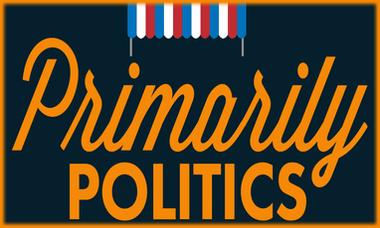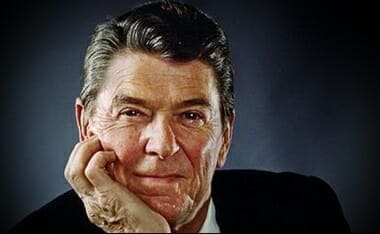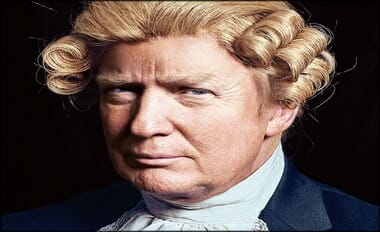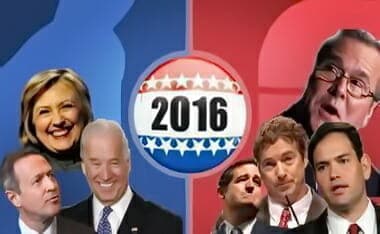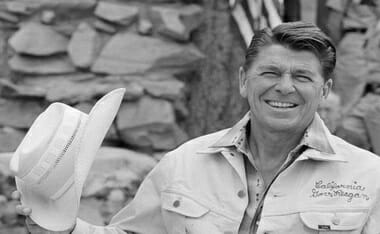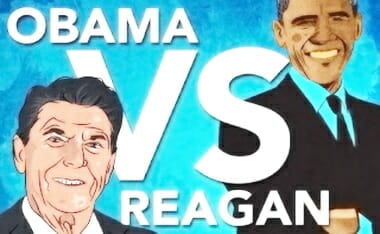(See also my previous post on this)
…all experience hath shewn, that mankind are more disposed to suffer, while evils are sufferable, than to right themselves by abolishing the forms to which they are accustomed. But when a long train of abuses and usurpations, pursuing invariably the same Object evinces a design to reduce them under absolute Despotism, it is their right, it is their duty, to throw off such Government, and to provide new Guards for their future security.–Such has been the patient sufferance of these Colonies; and such is now the necessity which constrains them to alter their former Systems of Government…
An “authentic, fully American history and tradition” is lacking in Trump’s thinking. To wit, reading this article by Daniel Krauthammer titled, Without Exceptionalism, both lifted me up as-well-as saddened me. The article made my spirit sour because of the reinvigorated understanding of “what it means to be an American” by a young man while-at-the-same-time my heart sunk because of the state of the American people in nominating a complete scoundrel in all regards to the Grand Ol’ Party. What a roller-coaster ride that was! I will take Charles Krauthammer’s word for it that Daniel “has the sharpest, most brilliant mind, sharper than mine.” Without further adieu, here is Michael Medved reading over and commenting on Daniel’s article:
The key point I see in Daniel’s piece is that Trump views markets, wealth, and ultimately America as a zero-sum game:
- Trump’s world is a zero-sum game, and Trump’s America will start winning again only when everyone else starts losing. This simplistic thinking defies logic and basic economics. But it does appeal to a certain sense of American nationalism: that “we” as a collective need to rally around a strong leader who will make us once again richer and more powerful than everyone else. Why? Because we’re us and they’re them. This kind of nationalism, however, is completely unexceptional. The leaders of literally any other country on earth could—and often do—say the same thing to their people and appeal to the same nationalistic sentiments. There is nothing uniquely American about what Trump espouses. There is no American ideal or philosophy providing a moral reason for this national mission to “win.”

He shows an almost Keynsein propensity that manifests itself in trying to fit the American Soul into an Excel spreadsheet — viewing “what” we are… kinesthetically… at his deepest understanding [if that even applies to “The Donald”] depicting the United States as the “Crimson Permanent Assurance,” a (mostly) standalone short in Monty Python’s Meaning of Life about “a crew of aged accountants who throw off the yokes of their oppressors, take up the mantle of corporate piracy and set sail on the high seas of international finance.”
What a joke!
What an ass.
Every day I am more-and-more convinced in my decision to leave the Presidential choice BLANK come November. For the first time, since I started voting, I will not vote for the President of These United States. Bill Kristol is right when he says that we have 5-months ahead of us of watching GOP pundits (like Sean Hannity and others) “defending, apologizing for, and excusing” Donald Trump’s obvious zero-sum intelligence.
Good luck with that.
Idiocracy
Gay Patriot (CFA) writes in response to a question by yours-truly that he recognizes that “primary campaigns get nasty,” he adds that he also gets
that our last two elections were decided by Low Information Voters, and that these voters are not moved by, for example, a Scott Walker type who is a brilliant policy reformer but dishwater dull. My concern is that if a candidate runs a campaign based on childish name-calling, outright lies, violent threats, and conspiracy theories and is rewarded with the presidency; not only will he govern likewise, but his strategy will become the template for all future campaigns. To me, it feels like the onset of Idiocracy.
If that is really where our culture is, then it doesn’t much matter who the president is.
I won’t be a part of it.
Amen to that! I won’t be either.
“America Guided by Wisdom”
(Click to Enlarge)
On the fore ground, Minerva, the goddess of Wisdom, is pointing to a shield, supported by the Genius of America, bearing the arms of the United States, with the motto UNION AND INDEPENDENCE, by which the country enjoys the prosperity signified by the horn of plenty at the feet of America. The second ground is occupied by a Triumphal Arch with the Equestrian Statue of WASHINGTON placed in front, indicating the progress of the liberal arts. On the third ground, Commerce is represented by the figure of Mercury, with one foot resting on bales of American manufactures, pointing out the advantages of encouraging and protecting Navigation, signified by an armed vessel under sail, to Ceres, who is seated with emplements of Agriculture near her. The Bee Hive is emblematic of industry; and the female spinning at the cottage door, shews the first and most useful of domestic manufactures.
~ Benjamin Tanner’s descriptive text.
The first black poet in America to publish a book, Poems on Various Subjects: Religious and Moral, spoke of this wisdom that guided one of our Founding Fathers in a poem entitled, “His Excellency General Washington.”
Just a small bio on this American gem before the poem:
- Phillis Wheatley, the first African-American to publish a book of poetry, was probably born in 1753 or 1754, somewhere in western Africa. At roughly 7 years old, captured by [most likely Arab] slave-traders. She was considered too sickly for hard labor plantations in the Caribbean or Southern U.S. colonies, she became a domestic servant for the Wheatley family in Boston. Though they kept slaves, the Wheatley’s were relatively progressive; after witnessing Phillis copying the alphabet in chalk, instead of punishing her, they decided to cultivate her academic interests. During a period when some states outlawed teaching slaves to read, Phillis was studying Alexander Pope and John Milton. Actually, the education she received from the Wheatley’s was superior even to most Caucasian males’ schooling.
May I also add to History Bitches slightly adapted info above that Phillis was also steeped in the Bible. And being a poet she was well aware of “lady wisdom” in Proverbs. (A more complete bio of her is below):
Celestial choir! enthron’d in realms of light,
Columbia’s scenes of glorious toils I write.
While freedom’s cause her anxious breast alarms,
She flashes dreadful in refulgent arms.
See mother earth her offspring’s fate bemoan,
And nations gaze at scenes before unknown!
See the bright beams of heaven’s revolving light
Involved in sorrows and the veil of night!
The Goddess comes, she moves divinely fair,
Olive and laurel binds Her golden hair:
Wherever shines this native of the skies,
Unnumber’d charms and recent graces rise.
Muse! Bow propitious while my pen relates
How pour her armies through a thousand gates,
As when Eolus heaven’s fair face deforms,
Enwrapp’d in tempest and a night of storms;
Astonish’d ocean feels the wild uproar,
The refluent surges beat the sounding shore;
Or think as leaves in Autumn’s golden reign,
Such, and so many, moves the warrior’s train.
In bright array they seek the work of war,
Where high unfurl’d the ensign waves in air.
Shall I to Washington their praise recite?
Enough thou know’st them in the fields of fight.
Thee, first in peace and honors—we demand
The grace and glory of thy martial band.
Fam’d for thy valour, for thy virtues more,
Hear every tongue thy guardian aid implore!
One century scarce perform’d its destined round,
When Gallic powers Columbia’s fury found;
And so may you, whoever dares disgrace
The land of freedom’s heaven-defended race!
Fix’d are the eyes of nations on the scales,
For in their hopes Columbia’s arm prevails.
Anon Britannia droops the pensive head,
While round increase the rising hills of dead.
Ah! Cruel blindness to Columbia’s state!
Lament thy thirst of boundless power too late.
Proceed, great chief, with virtue on thy side,
Thy ev’ry action let the Goddess guide.
A crown, a mansion, and a throne that shine,
With gold unfading, WASHINGTON! Be thine.
Richard Gamble writes about this “exceptionalism” with a warning…
In 1765, John Adams unwittingly penned one of the proof texts of American exceptionalism. “I always consider the settlement of America with reverence and wonder,” the young lawyer wrote in his diary, “as the opening of a grand scene and design in Providence for the illumination of the ignorant and the emancipation of the slavish part of mankind all over the earth.”
[….]
In 1814, half a century after the publication of his Dissertation on Canon and Feudal Law, John Adams wrote to his Southern adversary John Taylor of Caroline. In the course of defending his constitutional principles, Adams issued a warning that the new exceptionalists will never quote, let alone heed: “We may boast that we are the chosen people; we may even thank God that we are not like other men; but, after all, it will be but flattery, and the delusion, the self-deceit of the Pharisee.”
A people, as surely as an individual, cannot stand in the presence of the world and congratulate itself on its unassailable virtue without leading itself into moral blindness and earning the contempt of others. Nothing about the American achievement is “placed beyond all possibility of failure,” as John Quincy Adams boasted. It would be fatal for a republic to entertain such presumption. There is nothing inevitable about our future, and no facile talk about exceptionalism will make it so. A history and a tradition—an authentic, fully American history and tradition—is available to us, but only if we turn away from the myths of the new exceptionalism.
And so, goodbye…
…The past few days when I’ve been at that window upstairs, I’ve thought a bit of the ‘shining city upon a hill.’ The phrase comes from John Winthrop, who wrote it to describe the America he imagined. What he imagined was important because he was an early Pilgrim, an early freedom man. He journeyed here on what today we’d call a little wooden boat; and like the other Pilgrims, he was looking for a home that would be free. I’ve spoken of the shining city all my political life, but I don’t know if I ever quite communicated what I saw when I said it. But in my mind it was a tall, proud city built on rocks stronger than oceans, windswept, God-blessed, and teeming with people of all kinds living in harmony and peace; a city with free ports that hummed with commerce and creativity. And if there had to be city walls, the walls had doors and the doors were open to anyone with the will and the heart to get here. That’s how I saw it, and see it still.
And how stands the city on this winter night? More prosperous, more secure, and happier than it was eight years ago. But more than that: After 200 years, two centuries, she still stands strong and true on the granite ridge, and her glow has held steady no matter what storm. And she’s still a beacon, still a magnet for all who must have freedom, for all the pilgrims from all the lost places who are hurtling through the darkness, toward home.
We’ve done our part. And as I walk off into the city streets, a final word to the men and women of the Reagan revolution, the men and women across America who for eight years did the work that brought America back. My friends: We did it. We weren’t just marking time. We made a difference. We made the city stronger, we made the city freer, and we left her in good hands. All in all, not bad, not bad at all.
And so, goodbye, God bless you, and God bless the United States of America.
Phillis Wheatley
Phillis Wheatley was born in Senegal, Africa, in 1753. She was kidnapped at the age of eight and sent on a slave ship to Boston. Purchased by a prosperous Boston tailor, John Wheatley, she was trained as a personal servant for John’s wife, Susannah.
Phillis was quick and perceptive, and Susannah and her daughter Mary were drawn in a special manner to Phillis. Susannah considered Phillis a daughter, and Mary treated her like a sister. Both tutored her in the Scriptures and in morals, and within sixteen months Phillis had so mastered English that she was able to read the most difficult parts of the Bible with ease. Mary then taught Phillis astronomy, geography, ancient history, the Latin classics, and the English poets, all of which Phillis conquered with equal ease. Because of her aptitude for difficult knowledge and her ability as a brilliant conversationalist, Phillis was considered by the Bostonian intellectuals to be a child prodigy.
When she was only thirteen years old, Phillis wrote her first poetic verses; and then three years later, being an admirer of the celebrated Rev. George Whitefield, she authored a special poem about his life. This early interest in poetry continued for the rest of her life, and today Phillis is known as America’s first Black female poet.
In 1771, Phillis became a member of the famous Old South Church. It was later said that “her membership in Old South was an exception to the rule that slaves were not baptized into the church.”
In 1773, her health began to fail. A sea-voyage was recommended, and Mrs. Wheatley promptly saw to it that Phillis was manumitted (freed). Phillis traveled to England, where she was received by British royalty. While abroad, she published her first collection of poems, Poems on Various Subjects, Religious and Moral.
In 1775, while still abroad, and while the siege of Boston was underway in America, Phillis wrote a letter to the new Commander-in-Chief, General Washington, containing a special poem she had written for him:
His Excellency George Washington . . . Thee, first in place and honors, – we demand The grace and glory of thy martial band Fam’d for thy valor, for thy virtues more, Here every tongue thy guardian aid implore! . . . Proceed, great chief, with virtue on thy side, Thy every action let the goddess guide. A crown, a mansion, and a throne that shine, With gold unfading, Washington, be thine. . . .
Washington was touched by the poem; and when Phillis returned to America, Washington invited her to his military camp at Cambridge to honor her before his staff.
Phillis had returned to America when she had learned of the declining health of Mrs. Wheatley, who died shortly after her return. Phillis remained close to the family. She continued her writings and purposed to bring out a second volume of poems to be dedicated to Benjamin Franklin. Misfortune, however, intervened.
In 1778, Phillis married John Peters, a free Black. Although he appeared promising (he was a writer and had studied for the law), his character was deeply flawed: he was slothful, did not provide for his new wife, and failed to give her the care that her delicate health required. He also demanded that she isolate herself from her former friends and even required that she cut off all contact with the Wheatleys. Peters finally deserted Phillis.
Under these circumstances, and only five years after her marriage, Phillis died in obscurity at the age of 30, alone and in poverty, buried in an unmarked grave. Of her three children, two died in infancy, and the third was buried alongside her.
Despite the hardships in her life, Phillis never complained. In fact, she found a silver lining – or rather a Divine one – even in her tragic life of slavery. In her poem, “On Being Brought from Africa to America,” she wrote:
‘Twas mercy brought me from my Pagan land Taught my benighted soul to understand That there’s a God, that there’s a Savior too: Once I redemption neither sought nor knew. Some view our fable race with scornful eye, “Their color is a diabolic dye.” Remember, Christians, Negroes black as Cain, May be refin’d, and join th’ angelic train.
Phillis’ poetry was popular for generations after her death, and she was considered a heroine by those who fought to end slavery. She remains a shining example of a devout Christian, an accomplished poet, and a gracious and kind woman.




